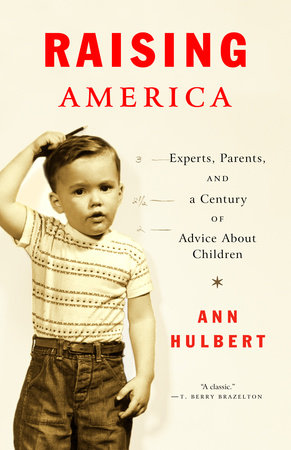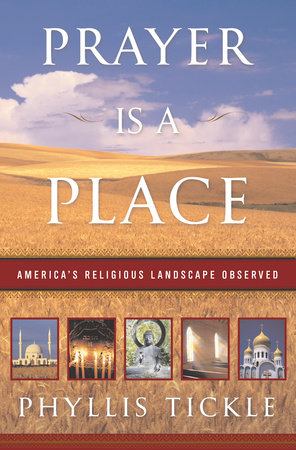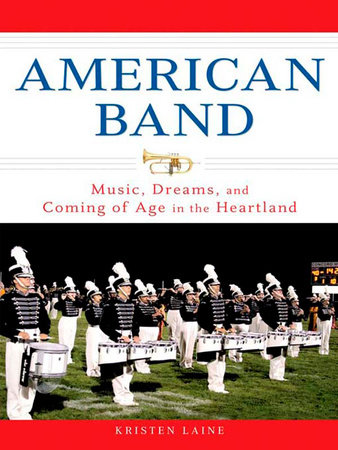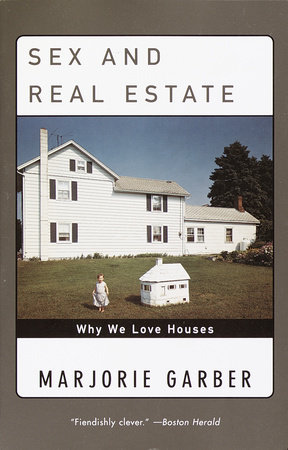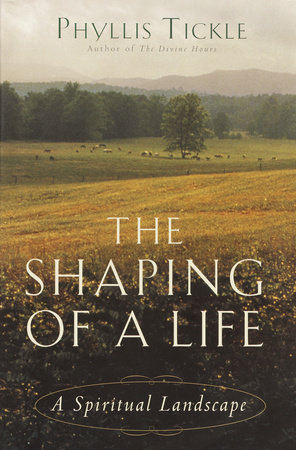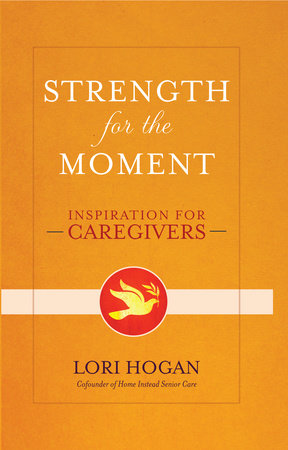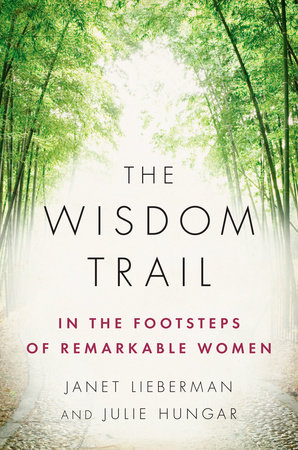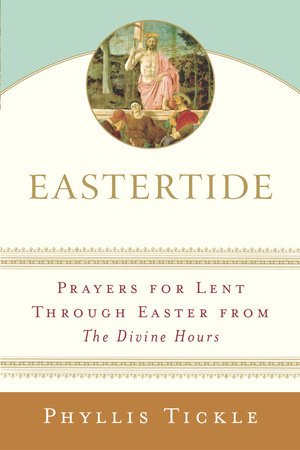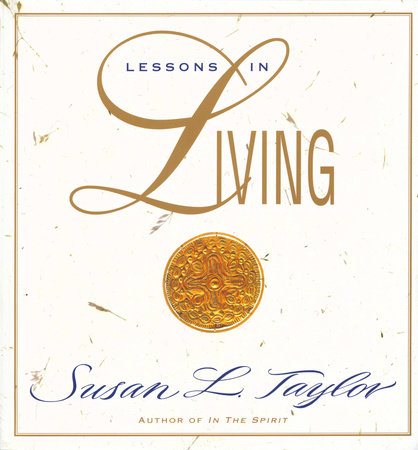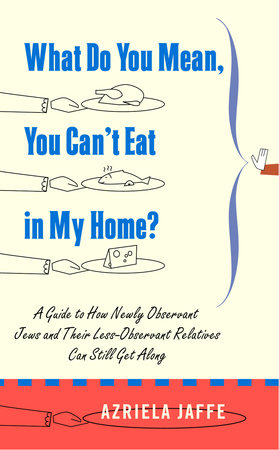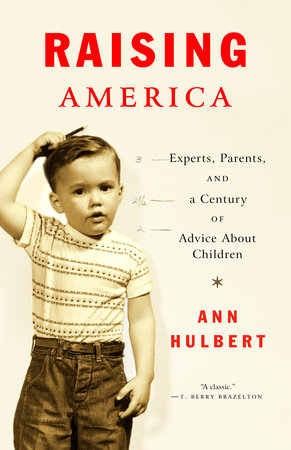Author Q&A
A Conversation with Ann Hulbert
Q: Your book surveys the history of American child-rearing advice from 1900 to the
present. What was new and different about the wisdom dispensed to parents over the past century in this country?
A: Until the turn of the 20th century, the reigning authorities on child rearing were still grandmothers. To be sure, other sages had offered their views on the young during two preceding centuries of rising interest in children. The pedagogical theories of 18th-century philosophers—mostly notably Rousseau and Locke—had aimed at enlightening fathers and teachers. In 19thcentury America, ministers took over, dispensing counsel to mothers from the pulpit.
But with the dawning of the modern era, a popular proselytizing mission took off, inspired by high secular and social expectations and a zeal for gathering empirical evidence. A new breed of guides emerged: scientific experts—medical and psychological—who promised that their studies of children’s natures would help save tender lives and reveal the secrets of systematic nurture. Data, straight from newly founded laboratories, would supplant superstition and dogma—mere grandmotherly lore. Children’s fates were no longer to be entrusted to God, but to studiously attentive mothers. With the help of experts, they would follow "unhesitating insight" instead of "uncertain instinct," and thanks to enlightened child care, the nation would progress into a glorious future. Social woes were to be vanquished in the cradle.
Q: You take a biographical approach, exploring the lives of a succession of experts over the decades to shed light on their childrearing advice. Why did you decide to take that
approach, and what do you think it shows?
A: The personal stories and quirky careers of each generation’s prominent experts help make sense of the advice they packaged for American mothers, which was never purely—or even mostly—the product of their laboratory research, however much they touted their scientific credentials. Part of what made the popular experts so popular was the extent to which they shared the middle-class social and psychological preoccupations of their times. Not that they were blandly representative figures by any means. Instead, the men whose lives I probe (the social outsiders), reared not quite in the mainstream by mothers and fathers out of step with a fast-changing world. Concern about being a "mama’s boy" turned out to be an occupational hazard of the experts, I discovered, as did conflicted relations with their fathers. It was precisely such worries that proved a key to the advisers’ success: these were men whose advice spoke to their fellow Americans’ similar anxieties about fitting into an ever more complicated, conformist society—and about standing out. And their deep ambivalence about women’s power inspired efforts to channel it into ever more professionalized conceptions of motherhood. It was a way of flattering mothers, and also—wittingly and unwittingly—of fettering them, too, by raising expectations so high they became ever harder to fulfill.
Q: According to the conventional wisdom about child-rearing vogues, the century has seen a series of pendulum swings, most notably a swerve in a permissive direction with Dr. Spock’s emergence as America’s mega-expert at mid-century. Did your work bear this out?
A: Actually, it turns out that each of the four generations of experts since the turn of the century has featured proponents of opposing child-rearing views—competing perspectives vying for prominence, rather than simply pendulum sings. Again and again, there has been a sort of Mom and Dad duo: one a softer advocate of bonding warmly with children and allowing their natures to unfold, the other a sterner proponent of discipline and parent-directed nurture.
As for Dr. Spock, he was hardly the Pied Piper of permissiveness he was portrayed as being during the 1960s, when he took to the streets as an antiwar activist. His hugely popular Common Sense Book of Baby and Child Care was hailed in 1946 for succeeding "to an amazing degree in striking a middle ground in [its] advice." His interwar predecessors had bequeathed a confusing legacy of conflicting counsel: Americans had been sternly told by behaviorists not to kiss their kids, and gently exhorted by maturationists to respond to children’s stage-by-stage needs. Spock aimed to be a voice of moderation, encouraging firm-but-friendly handling as he introduced parents to a very genial brand of Freudianism. He himself was concerned about "overpermissiviseness" long before his 1960s critics got worked up. Already in his second edition, in 1957, he made a point of urging a more "parent-centered" approach to child rearing. He kept on worrying about parental "hesitancy" ever after.
Q: Clearly there was competition not just among the experts in each generation, but
between the generations. Can you explain how that played out?
A: The story unfolds like a curious—and contentious—family saga, with each generation of experts (rather like each generation of parents) struggling to outdo their predecessors as they seized their moment to preside. In each era, the scientific claims of the experts became more grandiose, and their studies of children and prescriptions for parents became more ambitious. Meanwhile, as their audience grew, they worried more and more about what kind of influence they were actually having on mothers.
The pioneers at the turn of the century—an austere pediatric expert on infant nutrition named L. Emmett Holt and a romantic psychological authority on puberty named G. Stanley Hall—had high hopes that their fledgling studies of infant bodies and adolescent passions would point the way toward further discoveries and ever healthier child rearing. Their successors—the harsh behaviorist Dr. John Broadus Watson and Dr. Arnold Gesell, busy at Yale filming children’s maturation—each boasted a far more systematic science of "personality" formation. Environment, Watson insisted, was all-determining; heredity, Gesell was convinced, was the key. Each promised his science would endow parents with powers of prediction and control, yet worried that an increasingly "frazzled" audience of mothers was not up to the task. Dr. Spock, the super-expert swept in on the third wave, hoped to encourage a new level of emotional harmony between parents and children—and to restore confidence in parents he felt had been thoroughly bewildered by a surfeit of expertise that had not exactly panned out. America’s most popular Freudian, he was frustrated to find that his own success inspired yet more advisory lore—which hardly seemed to assuage parental anxiety. Amid 1960s tumult, he faced off against a far fiercer Freudian, Bruno Bettelheim; by the early 1970s, he confronted angry feminists. In the generation that followed, advice increasingly dealt with children’s cognitive growth, and counsel became ever more specialized—yet as polarized as ever, and now politicized, too.
Q: How has the experts’ evolving struggle reflected changes in 20th-century America?
A: Every generation of advisors has pursued a very ambivalent agenda, anxious to protect
children—and mothers—from what has seemed an ever more unwieldy world and at the same time eager to prepare them for it. The pioneers Holt and Hall, who focused on children’s bodies and characters, were preoccupied with the enervating complexity of newly urbanized life in industrial America. They aimed to preserve children from the dangers of "precocity," and to assure the vitality required to face an unpredictable future; for mothers, the ideal of "educated" maternity promised a newly restless generation of women a demanding career without ever leaving home. Gesell and Watson, who proceeded to tackle children’s and mother’s emotional "adjustment," confronted an America that emerged from World War I a more organized and institutionalized society. Their advice reflected rising concerns about the dangers and allures of social conformity, and of individuality.
For Spock, part of a mid-century generation unnerved by totalitarianism and caught up in a newly affluent consumerist society, the advisory theme had become anxiety: what children and mothers needed to thrive was a sense of security. With the arrival of the information age and the fracturing of American families, the experts’ focus shifted to children’s brains and minds; the race was on to fine-tune them to cope in an era of media overload and attenuated ties. Turn-of-the-millennium alarm over cultural drift and health dangers inspired an advisory trend that echoes the Victorian origins of the child-rearing mission: once again experts voiced concern about children’s moral characters, about an absence of spiritual values. Meanwhile, a crisis of childhood nutrition revived a focus on feeding.
Q: Are experts to blame for Americans’ anxious obsession with child rearing?
A: In child-rearing theory and practice, figuring out causation is notoriously hard: Is the brat the product of the spineless parent, or has an impossible child eroded a mother’s sense of
confidence and control? It’s a mutually reinforcing cycle. I think the same is true of experts, whose proliferation has been as much a symptom as a cause of widespread parental anxiety in an era of great social mobility and rapid cultural change. In a nation of immigrants eager to assimilate, the claims of family tradition were weak from the start. A burgeoning modern middle class placed its hopes in the younger generation, and the authority of elders was open to challenge—especially from up-to-date scientists. The experts readily answered the insistent popular demand for lab-tested wisdom, peddling advice based on the weakest of evidence. In turn, parents have felt overwhelmed by the confusing supply of conflicting counsel—and unnerved by so many efforts to soothe their anxiety. As Dr. Spock was not the first to discover, there’s a paradox built into efforts at reassurance: they have a way of intensifying the sense of inadequacy they aim to dispel. And what parent really aspires to banish worry anyway? It has become the emblem of worthy parenthood in the modern era: hyper-conscientious nurture has become the currency of virtue, proof of self-sacrificial devotion. All along, the function of advisors has been less to cure maternal worry than to provide a forum for airing and sharing it.
Q: The parenting shelves in the bookstores are now crowded with titles. Where does expertise stand today?
A: There are five times more parenting books published now than in 1970, many of them offering ever more specialized advice—down to pointers on dealing with the "sports-averse child." And the commotion has become ever more commercialized: gone are the days of child-rearing gurus conversationally conferring with housebound mothers. Expertise for the two-income generation is increasingly packaged as home-style management "systems," complete with trademarked styles—"attachment parenting," "affirmative parenting"—and web addresses.
Yet it’s still possible to discern the familiar two camps of advisers amid the confusion. Dr. T. Berry Brazelton, the “new Spock” for the Spock-marked baby boomers, emerged in the 1980s along with Dr. Penelope Leach at the head of the liberal, "child-centered" contingent. They blended cognitive wisdom with an emphasis on the importance of parent-child attachment. At the opposite end of the spectrum are the socially conservative "disciples of discipline," urging a reassertion of adult authority and of youthful self-control in a hedonistic culture. Led by Dr. James Dobson, founder of the Focus on the Family parenting "ministry," they have been gathering recruits to the "parent-centered" cause over the decades, invoking "the voice of Grandma" and the Bible more often than science.
For all the differences among the experts—which both sides usually like to play up—they’re more similar than you might expect, however. "Authoritative parenting" is the rallying cry of experts of every stripe these days, who all lament a corrosive, media-saturated culture that has encroached on childhood and hobbled parents’ best efforts to shield youths and guide them. Child-rearing experts have gotten restless in their roles as psychological counselors. They’ve stepped forth as public advocates who push different social agendas, yet who join in inveighing against a family-unfriendly society.
Q: What drew you to this subject?
A: I’ve been tempted to fabricate a little, and portray myself as an expert—addled mother who went looking for a book that would help her sort out the welter of advisers, and finding none, set out to write it herself. The truth is, I began writing about children and about family issues as a childless editor and writer at the New Republic. When I did have my own kids, I did what Dr. Spock told me, and made sure not to pile the books too high on the bedside table. My babies were not easy, but I had what really helps: a great husband, and a babysitter who was—of all things—a grandmother herself. She did more than any book to help me muddle, in part by showing me there were lots of ways to handle the home front, and that hers and mine could be quite different and still work. In fact, I came to this book as a Spock-marked baby boomer, part of a generation defined by acute self-consciousness about its own embattled rearing—and obsessed with proving ourselves to be more enlightened mothers and fathers than our own were, against harder odds. Only then, maybe, do we think we will at last feel truly grown up. I wondered when this preoccupation with expert-informed nurturing had started—where Dr. Spock had come from, and how to think about his countless successors. What did the experts really tell us about ourselves and our children, since they were plainly guides to concerns and confusions that went much deeper than issues like toilet training? "Don’t be overawed by the experts," Spock told our parents, and us. As my kids emerged from the exhausting nursery stage, I felt bold enough to embark on the kind of scrutiny of the experts that they had long trained on us parents.
Q: You’ve now immersed yourself in decades of child-rearing expertise. Have you come away with a favorite, or with some advice that no parent can afford to miss? Or, are you ready to tell us, the experts are a pernicious influence we better ignore if we have any hope of remaining calm?
A: There has been plenty of foolish advice, and lots of bad science, as my book shows. But I also think there’s probably been undue alarm about the experts’ intimidating influence—plenty of the panic, it’s worth noting, peddled by the experts themselves as they promise that they alone can rescue mothers and fathers from confusion. The truth, as the experts have again and again been forced to acknowledge, is that parents may peruse their advice, but that’s not the same as really using it. It’s hard to know what parents actually do with the child-rearing lore they read, but to judge by all the advice on offer, it’s safe to say they’re fickle at best—hardly models of slavish obedience, or even deference. We may be buy-the-books parents, but how many do you know who truly strive to be by-the-book parents?
I’ve come away eager to peddle some counter-intuitive advice about advice. The typical counsel that post-modern mothers and fathers get is to shop around for the expert whose child-rearing philosophy "fits" them and their family—which is, by now, what most of us do. But my own wanderings convince me that it may be the guidance that goes against your grain that will prove unexpectedly enlightening—even liberating. After all, the camp of gurus we’re naturally inclined to align with—whether it’s the softer or the harder school of views and values that jibe with our own—are the ones whose expectations we aspire to live up to, which means we also guiltily fear we fail to. By contrast, advisers in the opposite camp jolt us out of our familiar concerns. They can offer us a fresh perspective, which we can feel far freer to adapt or reject as we see fit; they’re not "our" experts.
And the surprising revelation of a century’s worth of expertise is that the tough and gentle approaches are rarely quite what they seem. It’s the "hard" advisers, busy bossing mothers around and warning about too much bonding, who often end up leaving both mothers and kids more independence and freedom to maneuver. And the "soft" experts who champion maternal engagement in children’s unfolding development are not as laid back as they try to sound. They can turn out to be the ones scripting an emotional drama that is more controlling for all concerned: the solicitous mother and the "understood" child have struggled for a sense of independence.
The truth is, each camp’s natural constituencies could stand to hear what the other side’s experts have to say. It’s liberal, dual-career families that generally subscribe to the "child-centered" ethos of "intensive mothering"—all but guaranteed to leave them worrying they’ll never measure up. But listen to the no-nonsense disciple of discipline John Rosemond, who’s popular with a more traditionalist clientele: he tells mothers to back off, that kids thrive on less attention, not more, and should be expected to pitch in at home. And he insists that
fathers should, too—no more "parenting aide" status for them. The messenger’s brash tone and politics may not suit, but the message sounds like one weary working mothers might well welcome.
